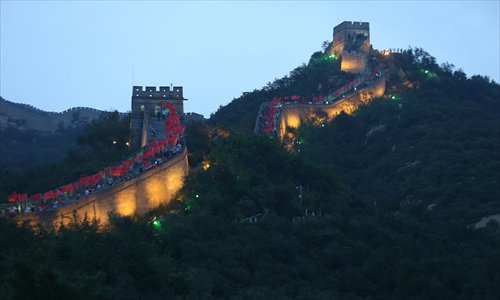HOME >> CHINA
Beijing beats Almaty in 2022 Winter Olympics bid
By Jiang Jie Source:Global Times Published: 2015-8-1 0:53:02
Tri-city zone ready for boost from victory

People celebrate the succcessful bid of Beijing and Zhangjiakou to host the 2022 Winter Olympics on the Great Wall in Beijing on Friday. Photo: IC
Beijing narrowly won the vote for the 2022 Olympic Winter Games on Friday, becoming the first city to be awarded both the Summer and Winter Games, and beating Almaty, Kazakhstan by 44 to 40.
Analysts said the decision would help contribute to both winter sports development in China and further spur the social and economic growth of the country.
Beijing presented itself as a safe pair of hands in comparison with the former Kazakh capital, which ate into China's support on the IOC with an impressive late "Keeping It Real" campaign that played on China's reliance on artificial snow and long distances between its venues.
"We represent the safest and most realistic choice," said Beijing's Mayor Wang Anshun.
China's basketball legend Yao Ming and Sports Minister Liu Peng leaped to their feet in joy when the result was announced. "Finally - we won, but it was not easy," Yao acknowledged.
Narrow victory
Craig Reedie, a British member of the IOC, said the 85 voters had been impressed by the final presentation by Kazakh Prime Minister Karim Massimov.
Others said they still preferred the assurances offered by China as opposed to oil-rich Kazakhstan which had been making its third bid for the Winter Olympics.
In a video message to the IOC meeting, Chinese President Xi Jinping promised rock solid government support for Beijing if it was chosen. "If you choose Beijing, the Chinese people will present to the world a fantastic, extraordinary and excellent Olympic Winter Games."
Analysts pointed out that China's strong overall national strength outshone Kazakh in the bid, which evaluated more than just sports.
"China has successfully held several world sports events and Beijing's experience in holding summer Olympics in 2008 guarantees its organizational capability," said Ren Hai, an Olympic studies expert with Beijing Sport University.
Beijing is also on a smaller budget, only needing to renovate stadiums from 2008 Olympic Games, said Zhao Jisheng, an associate professor at the College of Sports at Beijing Normal University.
The Kazakhstan bid team's organizers had hoped that staging the Winter Olympics would put their city on the international sporting map.
The decision to go with China again reaffirmed the shifting power-base of world sport, with East Asia now poised to host three successive Olympics. South Korea's Pyeongchang will host the 2018 Winter Games and Tokyo the 2020 Summer Olympics.
The 2022 Games is scheduled to be held in February 2022. Six cities had entered the race for 2022 but Beijing and Almaty were left as the only candidates when Oslo in Norway, Stockholm in Sweden, Krakow in Poland and Lviv in Ukraine withdrew for financial and political reasons.
"China's social and economic stability also helped gained trust from the IOC especially as many other countries that have suffered from political or financial chaos," Ren said, adding that it is a good timing for Beijing as the IOC reform agenda for 2020 encouraged host cities to lower costs.
Low-key celebration
Xi sent a letter of appreciation to the IOC President Thomas Bach on Friday evening, expressing thanks to IOC for its trust and support.
"To present a fantastic, extraordinary and excellent Winter Olympics is the aspiration of over 1.3 billion Chinese people. We will fulfill all our commitments and witness, together with the people of all other countries and the IOC, the advent of a new phase in the development of the Olympic winter sports and in the spread of the Olympic spirit."
In 2001, Beijing reverberated with celebrations after being chosen as the host city of the 2008 Olympics, as excited crowds thronged into the city streets in an outpouring of joy.
About 6,000 people celebrated the success of the bid in the Olympic Park in Beijing on Friday evening, which was also attended by Liu Yunshan, a member of the Standing Committee of the Political Bureau of the Communist Party of China Central Committee.
As the first-time host city for the Winter Olympics, Beijing no longer treats the Games as a cultural symbol for a rising power, but will use it as a chance for social and economic development, analysts said.
"By hosting the Games with Zhangjiakou, Hebei Province, Beijing can use it as a cooperation platform to push forward the regional integration of Beijing, Tianjin and Hebei," Ren said, adding that the Games will add to the city's determination to curb air pollution.
Luo Le, a Beijing-based sports commentator, told the Global Times that the Winter Games will also complement China's sports development, which has excessively focused on traditional games.
"Unlike some Western countries, Chinese people used to have a reluctant attitude toward winter sports, for their high costs were also often treated as a symbol of being a playboy. There was also inadequate education and reports on winter sports, which will hopefully change after the Winter Games," said Zhao.
Agencies contributed to the story
Newspaper headline: Beijing beats Almaty in Olympics bid
Posted in: Society